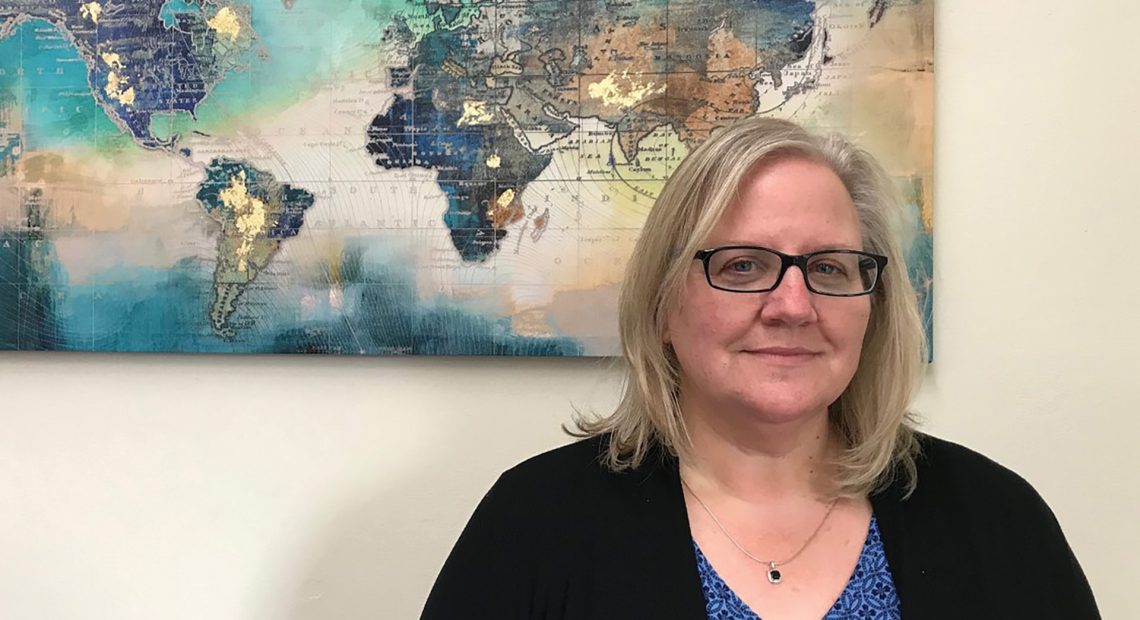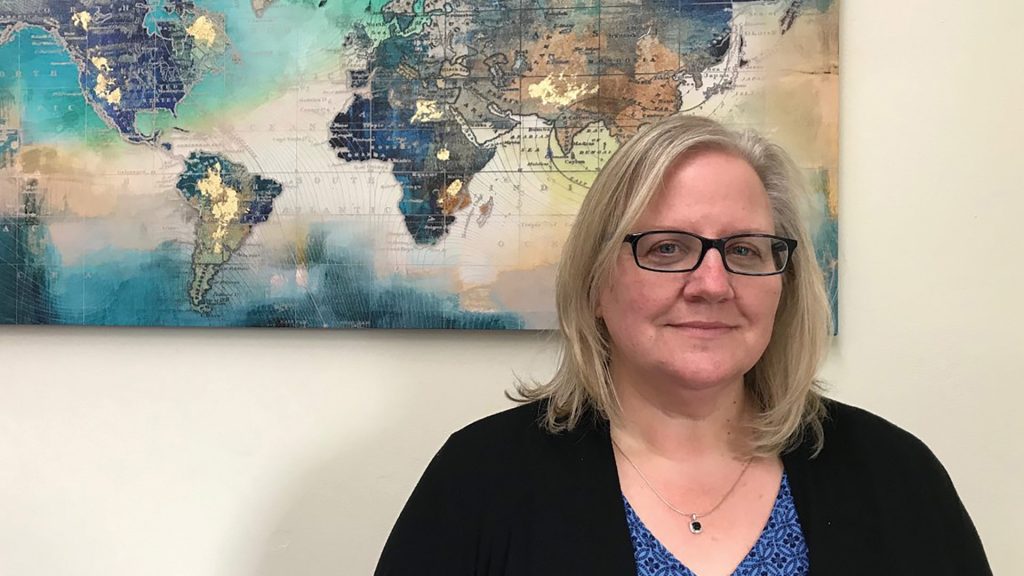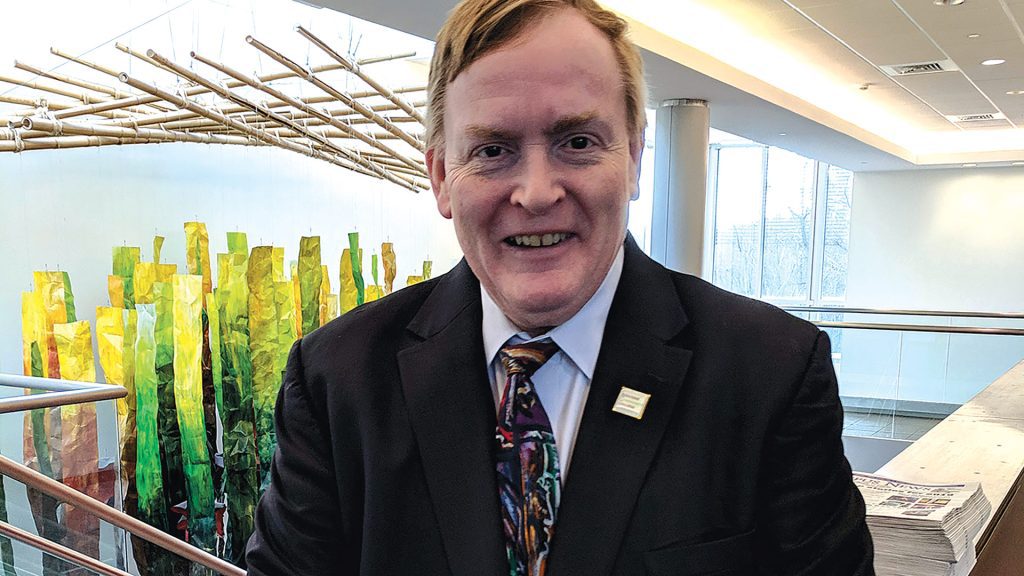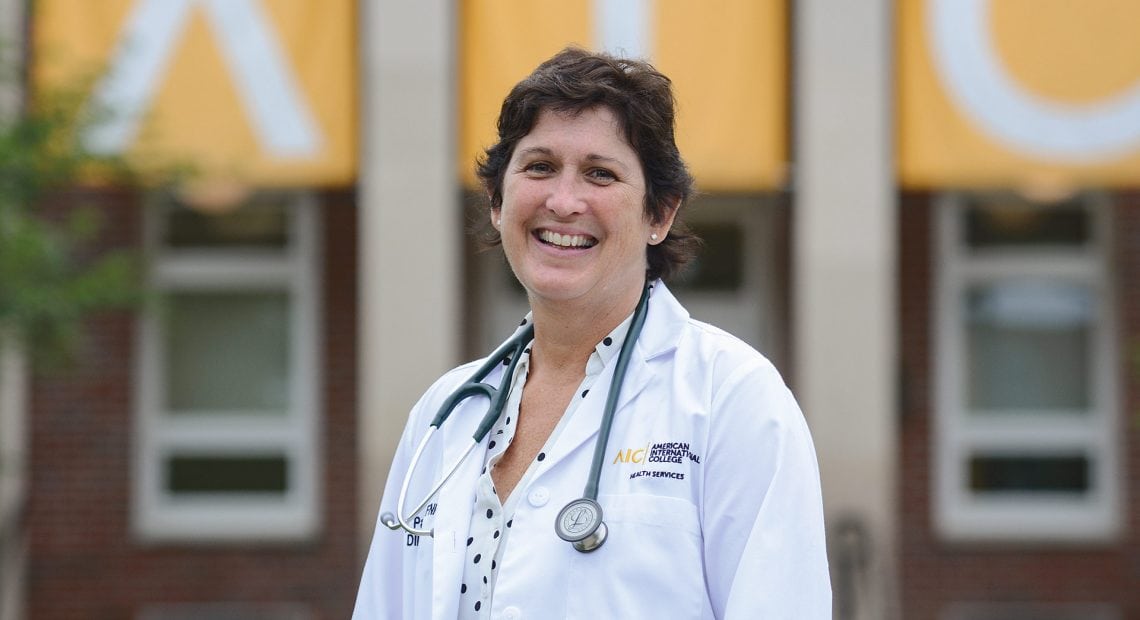This Compassionate Leader Has Transformed Health and Wellness on the AIC Campus
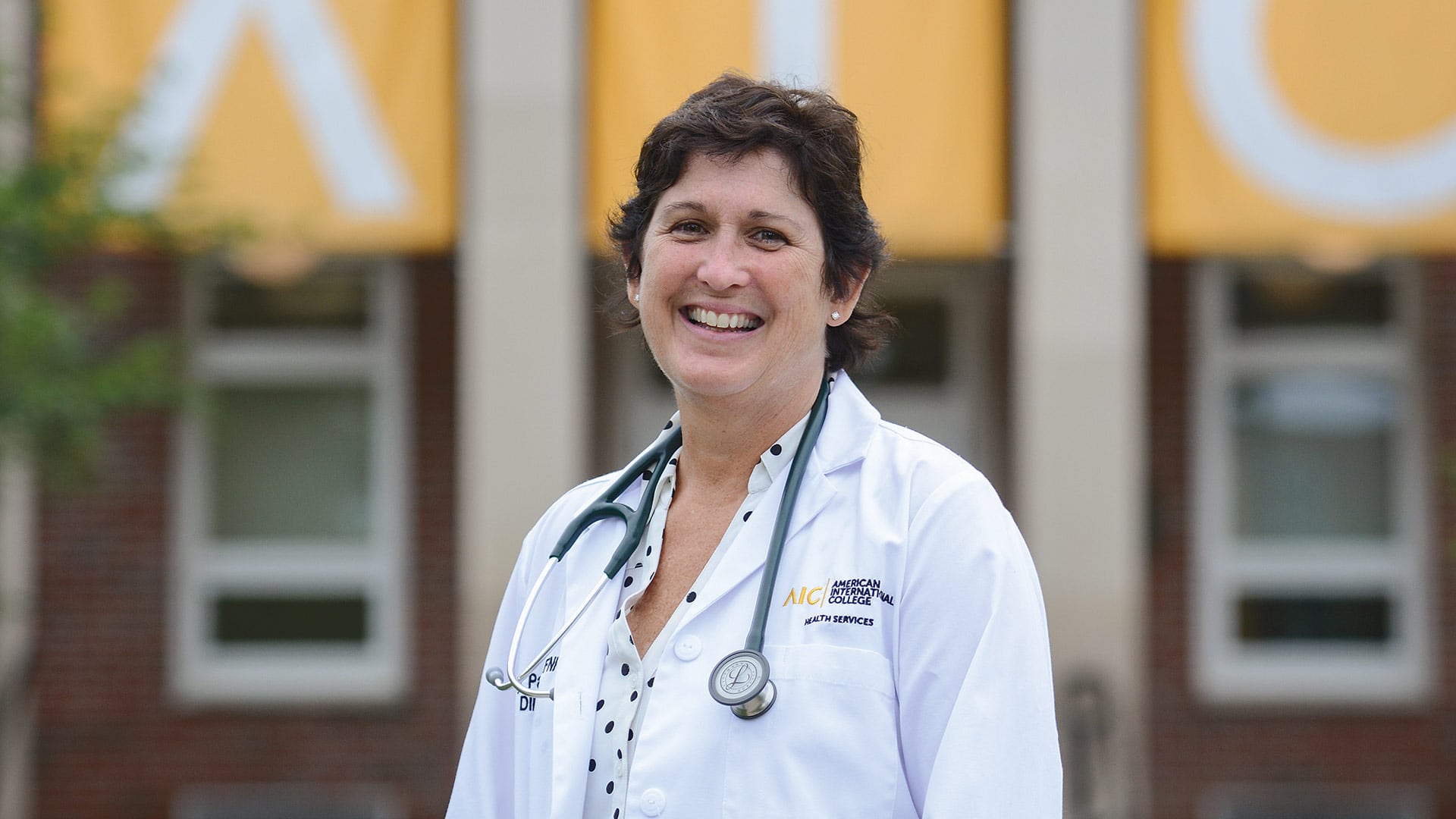
Mary Paquette
‘Sex and Chocolates.’
Sounds like one of Hollywood’s late-summer releases. But instead, it’s one of the many intriguing new programs and initiatives launched by Mary Paquette, MS, FNP, in her role as director of Health Services at American International College.
And now that we have your attention — and we almost certainly do — we’ll tell you about it.
Not long after arriving at the college in 2012 to accept the challenge of resuscitating a moribund health-services facility that few students knew about or ventured to (for a host of reasons we’ll get into later), Paquette decided she needed to do some serious outreach.
And it would be undertaken with a number of goals — from introducing (or reintroducing) students to the health facility (known as the Dexter Center) to providing some education, to gaining some insight into the many issues and challenges confronting AIC’s diverse population, many of them first-generation college students.
“There were questions on everything from STD education to things you would think of with Dr. Ruth; I learned some things from these students, and it ended up being a lot of fun.”
So, as part of this outreach, Paquette and Millie Velazquez, office manager and medical assistant at the center, went into one of the female freshman dorms with a large fishbowl containing some questions they had already put in, some chocolates, and a thirst for more questions about sex from the students they greeted.
“If they were brave enough to ask a question, they got a chocolate,” said Paquette, who recalled, with a large dose of pride, that she and Velazquez left with considerably fewer treats than they arrived with. “There were questions on everything from STD education to things you would think of with Dr. Ruth; I learned some things from these students, and it ended up being a lot of fun.”
As noted, Sex and Chocolates is just one of many initiatives Paquette has introduced since arriving. Overall, she has taken the campus service that was traditionally ranked dead last in surveys of students and made it one of the more highly scored.
Far more importantly, she has taken health and wellness to a much higher plane on the AIC campus, providing not just Band-Aids and Tylenol — which is about all the ‘old’ center was known for — but also a welcoming, non-judgmental environment that has improved quality of life on the campus in myriad ways.
For all that, Paquette was named the Healthcare Hero in the category of Patient/Resident/Client Care Provider, which is among the most competitive, with nominees from across the broad spectrum of healthcare.
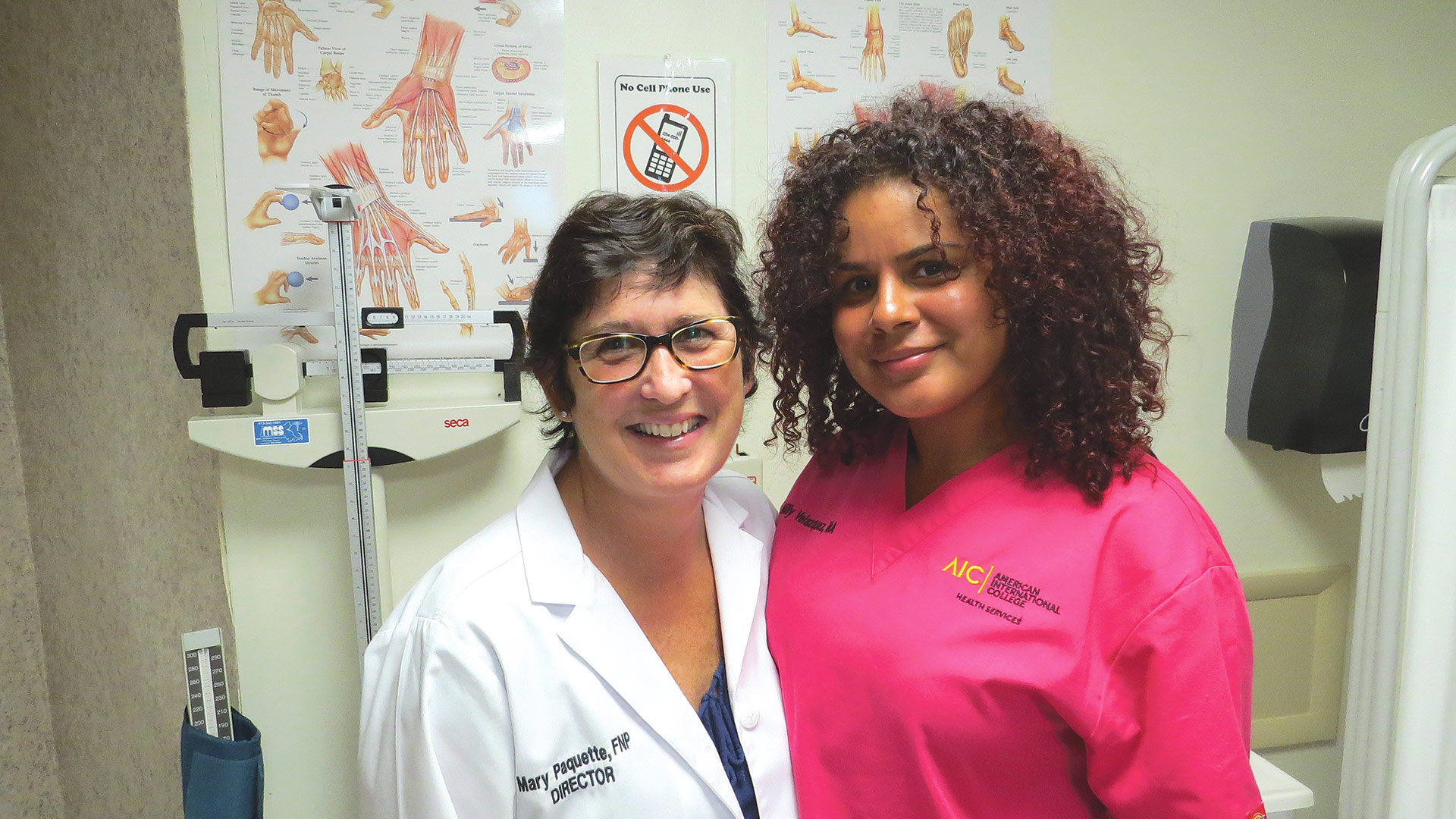
Mary Paquette and Millie Valazquez, office manager and medical assistant at the Dexter Center, have changed attitudes about the center, and created a healthier campus community, through programs like ‘Sex and Chocolates.’
And it’s a category Paquette has essentially devoted her life to, with AIC being only the latest stop in a 35-year career that has seen her take on a variety of roles in a host of settings. These range from director of Nursing at Ludlow Hospital to per-diem hospitalist at in the GI Department of the Eastern Connecticut Health Network, to assistant director of Health Services at Western New England University — the job that became the springboard to her post at AIC.
And there is a huge amount of overlap when it comes to the lines on her résumé, which Paquette explained quickly and effectively.
“I have a lot of energy, and I like to keep busy,” she said in a classic bit of understatement.
Indeed, she does, and at AIC this energy has translated into profound and very positive change, which was summed up by Robert Cole, the college’s vice president of Marketing & Communications, as he nominated Paquette to be a Healthcare Hero.
“Since arriving in 2012, Mary has almost single-handedly transformed the capabilities and perception of AIC’s Dexter Center for Health and Counseling Services,” he wrote. “She has worked tirelessly and passionately to reach students through new, campus-wide health programming and healthy-living promotion; expanded the scope and availability of Dexter’s services; and routinely works off hours to meet the emergency needs of students, student-athletes, faculty, and staff. She has done all this with limited medical staff and budget, and unlimited dedication, compassion, and extraordinary patient care and customer service.”
With that summation as the backdrop, we’ll explain how this transformation took place and what it means for all those — and we mean all those — on the AIC campus.
Sweet Success
The large Victorian home on Wilbraham Road that houses the Dexter Center has enjoyed a long history at the college and filled a number of roles.
It was once the president’s home, for example, and it has housed classrooms, a photography lab, and other facilities.
But when Paquette first saw it in the summer of 2012, she simply couldn’t believe that its role at that time was home to health services.
“It was falling down, the floors were this awful purple tile, it was filthy … I told Mark, ‘I wouldn’t come here for healthcare,’” she recalled, referring to Mark Berman, then vice president of Administration, who has since passed away. The building was in such poor condition that it was almost a deal breaker when it came to the position she was being offered.
Berman was neck deep in getting the dormitories ready for fall, but he promised Paquette that by October, she would see radical improvement in the Dexter Center. He made good on that pledge, but Paquette spent every weekend her first month on the job cleaning it out herself.
“There were ACE wraps that were disintegrating because they sat on shelves for long,” she recalled, adding that dirt on the floor wasn’t the only thing she cleaned out. There was also the receptionist on duty at the time who was so unfriendly, students hated coming to the facility.
But tidying up the Dexter Center and making it a far more welcoming — and less purple — place were only the first steps in a multi-layered process, and only the latest chapter in a long and quite rewarding career in healthcare.
So before returning to Sex and Chocolates and other endeavors at AIC, let’s go back … to the former Ludlow Hospital.
That’s really where the story starts, because, well, Paquette was born there and grew up only a few blocks away. She worked there as a nurse’s aide when she was 18 and in the ER while in college, and, after earning her bachelor’s degree in nursing at Elms College and spending the first several years of her career in the Boston area, that’s where she returned to.
She would eventually become the last director of Nursing at the facility, which would close its doors in 1994. But Paquette has never forgotten the mentorship she received there or the many connections she made that continued to benefit her throughout her career.
Ludlow’s closing prompted her to go back to school and earn her master’s degree in the Family Nurse Practitioner program at UMass Amherst in 1999, and, as noted earlier, she would put it to use in a number of settings over her long career as a care provider. They include Noble Hospital in Westfield, the Johnson Occupational Medicine Center in Enfield, Johnson Memorial Hospital in Stafford Springs, Hartford Hospital, and Mercy Medical Center.
Starting in 1999, though, her main employer would not be a hospital or medical center (although she would continue to work for several of them), but an institution of higher learning.
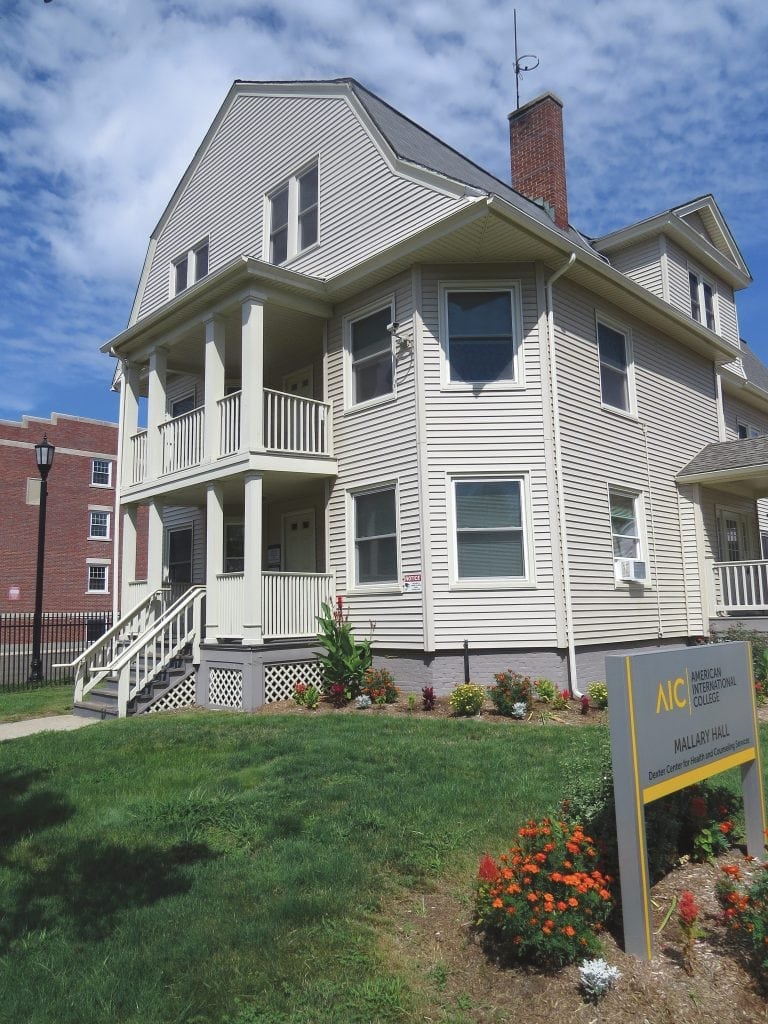
When Mary Paquette first saw the facility on Wilbraham Road that housed the Dexter Center, she couldn’t believe people came there for healthcare.
At Western New England University, she started as a provider — and there was only one at the health center at any given time. “So you just put the pedal to the metal,” he recalled. “But for me it was OK, because it was just like the ER atmosphere … you just go, go, go and see one patient after the other. The trick in that is being able to be efficient, but also make patients feel like you’re listening to them and not rushing them.”
Remember that thought later.
At WNEU, she was mentored by the director of Health Services there, Kathy Reid, who, Paquette said, “was open to anything and everything I wanted to do.”
That meant such things as adding IVs to the list of services, as well as suturing and other initiatives. “Over the course of 13 years, we built Western New England’s facility into an amazing clinic. And when they built the new Pharmacy building and they added a new health services [facility], we even had a little surgery suite … we took off more toenails in the fall from turf toe.”
Remember those thoughts as well.
Paquette said she loved her time at WNEU and had no desire to leave. But then, Brian O’Shaughnessy, then AIC’s dean of students and now vice president for Student Services, hired Reid as a consultant to evaluate an underperforming health-services department — what Paquette described as a glorified (maybe) “high-school nurse’s office” — and recommend changes.
In her report, Reid said, in essence, that the school needed to hire a director of Health Services. And she had the perfect candidate — her second in command — in mind.
Something to Chew on
As noted earlier, the Dexter Center simply wasn’t a popular, or busy, place before Paquette arrived. Summing up why, she said simply, “one, it wasn’t marketed, two, it didn’t offer much care beyond Band-Aids and Tylenol, and three, the it had a secretary who was a real grouch.”
So … she set about changing all that and more. One of the first things she did was hire Velazquez (a referral from her mentor, Reid) and broaden that position to one of office manager and medical assistant.
Through what Paquette described as “an over-the-top friendly personality,” Valezquez has changed the atmosphere in the center, making it more welcoming, more efficient, and far-more visitor-friendly.
Meanwhile, the two have together gone about greatly adding to its roster of services and doing that marketing that was a big missing piece.
With the former, they’ve added IVs and suturing, as happened at WNEU before, and also STD testing, safe-sex education, a bowl filled with condoms in the waiting room, counseling, ongoing education into how the healthcare system works, and, most importantly, no judgment.
Overall, Paquette said she wants to make students better healthcare consumers.
“I feel that a large part of my job is teaching students how to be good healthcare advocates,” she explained. “I want them to leave AIC with a better understanding of their own health and the tools they need to navigate the world of healthcare.”
Regarding the latter, Paquette knew it wouldn’t do any good to make all those other changes if students and other constituencies didn’t know about them. And she knew from her time at WNEU that the place to start was with the resident advisors in the dorms.
With their support, she went about creating what she called silly but also effective programs. Like Sex and Chocolates.
“When you’re doing a dorm program in the evening, you have to be entertaining,” she explained. “The healthcare piece of it … you slip that in when they’re not looking. It was more about them, the students, seeing Millie and I, and seeing that we’re friendly and we’re non-judgmental, but we also know what we’re doing.”
Paquette and Velazquez have initiated other programs with the same goals and underlying mindset, including ‘Cards Against Humanity; AIC Edition,’ a takeoff on the popular party game. Sprinkled in with the offensive, risqué, and politically incorrect ‘answer cards’ are several related to birth control, STDs, the Health Services department, and more.
“You sort of slide those questions in, the students get them, but they’re having fun, and they don’t realize that you’re educating them,” Paquette explained. “We’ve created lots of fun games like that.”
But there were other constituencies to connect with, she went on, starting with the athletes on campus. Each team has trainers, she noted, but there was a disconnect, if you will, between the students, trainers, and health services.
That’s ‘was,’ because Paquette set about improving communications and building bridges. And soon, athletes were finding the Dexter Center for suturing, screenings, and other services.
“I feel that a large part of my job is teaching students how to be good healthcare advocates. I want them to leave AIC with a better understanding of their own health and the tools they need to navigate the world of healthcare.”
“We have rugby here,” she noted. “In those first two years, I’d come in at least a dozen times at night, go to the athletic trainers’ room, throw some stitches in a kid’s head, and go home. My deal with the trainers was, they all had my cell phone, they could call, and as long as I wasn’t working one of my ER shifts, I’d come in; that’s how we won over athletics.”
Paquette and Velazquez have also won over commuting students, college employees, students who remain on the campus during the summer, and other constituencies. The health and wellness center that no one visited is now the facility everyone visits.
Stitch in Time
Paquette doesn’t just work at AIC; she has become, for lack of a better term, a huge booster.
On top of the cabinet in her office sit three large wooden block letters — ‘A,’ ‘I,’ and ‘C.’ And she has much more swag, as she called it, all bearing the school’s letters, logo (a muscular, mean-looking yellowjacket), and color — yellow (obviously).
The item she’s most proud of, though — perhaps even more than a full bowl of questions during a presentation of Sex and Chocolates — is a T-shirt given to her by the rugby team signed by all the players, many of whom had seen Paquette for some stitches.
Maybe more than anything else, that T-shirt shows just how much the health and wellness center has grown since Paquette arrived, and how it has ceased being a college service and instead become a powerful force on campus.
George O’Brien can be reached at [email protected]














